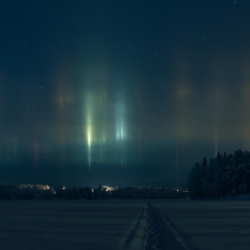A zulat for Pesaḥ Sheni. Each line begins with a word from Numbers 9:11 followed by a letter spelling out “Remember me for good, amen,” excepting the final five lines. The first of these concluding lines is the refrain from the ahavah for the same set, and the final four all begin with hei and transition into the berakhah. This zulat focuses largely on the Temple, where Pesaḥ Sheni offerings were held.
This is part four of a five-part series of yotsrot for Pesaḥ Sheni (which the author literally just finished the night of).
TOGGLE COLUMNS (on/off):ADJUST COLUMN POSITIONS: select the column header cell and drag it where you want. show me!COPY INDIVIDUAL COLUMN(S): use CopyTables, a browser extension.
| Source (Hebrew) | Translation (English) |
|---|---|
אמת ויציב עד אֵין אֱלֹהִים זוּלָתֶךָ |
“Emet v-Yatsiv” until “there is no god but You.” |
בַּחֹ֨דֶשׁ זִיו נִבְנָה הָרִאשׁוֹן הַשֵּׁנִ֜י כָּמֽוֹהוּ בֵּית תְּפִלַּת כׇּל־לָשׁוֹן | |
בְּאַרְבָּעָ֨ה רָאשֵׁי שָׁנִים הֵבֵֽאנוּ מַעַשְׂרוֹת עָשָׂ֥ר נֶאֶסְפוּ תַּֽחַת הַשֵּֽׁבֶט כְּבָשִׂים וּפָרוֹת |
On the four new years we brought tithes — Tenth one gathered under the staff, sheep and cows. |
י֛וֹם יָד רָמָה הוּא יוֹם זְרֽוֹעַ נְטוּיָה בֵּ֥ין לְאֻמִּים הוֹצֵאתָֽנוּ הֲלֹא הִיא גְּלוּיָה |
A day of the high hand[3] The gematria of the word “hand” is 14 it is, a day of the outstretched arm. Between nations You brought us out, hasn’t it been revealed? |
הָעַרְבַּ֖יִם טוֹבִים הֵם גַּם נִיסָן וְאִיֵּר יַעֲשׂ֣וּ וְיִשְׁמְעוּ בְּיוֹם מְשֻׁיָּר |
Two evenings good — both Nissan and Iyar — they will do and hear on the reserved day. |
אֹת֑וֹ בַּֽיִת אוֹתָהּ עִיר אוֹתוֹ הַמִּזְבֵּֽחַ עַל הָאֵשׁ תִּצְלֽוּהוּ כׇּל־יִשְׂרָאֵל זוֹבֵֽחַ |
That very house, that very city, that very altar — on the fire you will roast it, each Jew sacrifices. |
מַצּ֥וֹת אִכְלוּ לְזֵֽכֶר חִפָּזוֹן הַיְּצִיאָה וּמְרֹרִ֖ים מָרִים כְּמוֹ רֹאשׁ וְלַעֲנָה |
Matsot eat in memorial of the speed of exit, and bitter herbs as bitter as gall and wormwood. |
יֹאכְלֻֽהוּ נָא בְּשִׂמְחָה כִּי הוֹשַׁעְתַּֽנִי לֹא־עָשָׂה אֶת־הָרִאשׁוֹן יַעֲשֶׂה אֶת־הַשֵּׁנִי׃ |
They will eat it — please — in joy, for You saved me. One who did not do the first may do the second. |
הַשֵּׁנִי כָּרִאשׁוֹן בִּלְשׁוֹן יָם מִצְרַֽיִם הֶעֱבַרְתָֽנוּ מֵאָז וְתַעֲבִירֵֽנוּ שִׁבְעָתַֽיִם הַיּוֹצְאִים רָאוּ וְעָמְדוּ עַל־רַגְלַֽיִם הַשִּׁיר שֶׁשָּׁרוּ נָשִׁיר בְּכִפְלַֽיִם׃ |
The second, like the first, at the tongue of the Egyptian sea,[4] Isaiah 11:15 You crossed us once, and will cross us sevenfold. Those going out saw and stood on their feet — the song that they sang we will sing doubly! |
עֶזְרַת אֲבוֹתֵינוּ… |
(continue) Help of our ancestors… |
Notes

“בַּחֹדֶשׁ זִיו | Ba-Ḥodesh Ziv — a zulat for Pesaḥ Sheni, by Isaac Gantwerk Mayer” is shared through the Open Siddur Project with a Creative Commons Attribution-ShareAlike 4.0 International copyleft license.










Leave a Reply